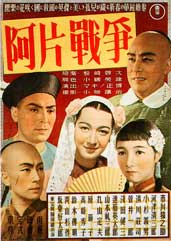 W
WAhen senso (阿片戦爭) aka The Opium War is a 1943 black-and-white Japanese film directed by Masahiro Makino.
 W
WAinu Mosir is a 2020 Japanese drama film directed by Takeshi Fukunaga. It features a story about a young Ainu boy, and deals with issues around the conflict between his personal thoughts, modern Japan, and the way of his traditional Ainu heritage. The film featured as a premier at the Tribeca Film Festival.
 W
WAizō Tōge is a 1934 black-and-white Japanese film directed by Kenji Mizoguchi. It is a lost film.
 W
WArima neko (有馬猫) a.k.a. Ghost Cat of Arima, a.k.a. Ghost Cat of Arima Palace, is a black-and-white 1937 Japanese horror film directed by Shigeru Kito. The film was remade with the same title by Daiei Films in 1953.
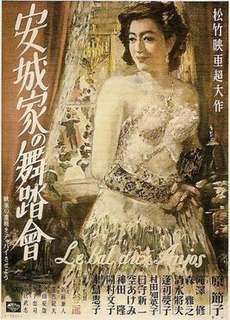 W
WA Ball at the Anjo House is a 1947 Japanese film directed by Kōzaburō Yoshimura. The film won 1947 Kinema Junpo Award for the best film.
 W
WBattle of Roses is a 1950 Japanese drama film directed by Mikio Naruse. It is based on a novel by Fumio Niwa.
 W
WChūkon giretsu: Jitsuroku Chūshingura is a 1928 Japanese black-and-white silent film with benshi accompaniment directed by Shozo Makino. It was an epic created to commemorate Makino's 50th birthday and is based on the classic theme of Chūshingura. During the production of this film, a fire broke out, destroying parts of the original film, but it has since been restored.
 W
WCrimson Bat is the international title for the series of four jidaigeki films based on the character Blind Oichi .
 W
WOrizuru Osen (折鶴お千) is a 1935 black and white Japanese silent film directed by Kenji Mizoguchi, starring Isuzu Yamada. It is based on Kyōka Izumi's novel Baishoku Kamo Nanban.
 W
WEdo Sangokushi aka The Three Patriots of Edo is a 1928 black-and-white silent Japanese film directed by Seika Shiba.
 W
WFukushima 50 is a 2020 Japanese drama film directed by Setsurō Wakamatsu and written by Yōichi Maekawa. Starring Koichi Sato and Ken Watanabe, it is about the titular group of employees tasked with handling the meltdown of the Fukushima Daiichi Nuclear Power Plant after the 2011 Tōhoku earthquake and tsunami. The film is based on the book by Ryusho Kadota, titled On the Brink: The Inside Story of Fukushima Daiichi, and it is the first Japanese film to depict the disaster.
 W
WGinza Kankan Musume is a 1949 black and white Japanese film directed by Koji Shima.
 W
WGozonji Azuma Otoko (御存知東男) is a 1939 black-and-white Japanese film directed by Eisuke Takizawa.
 W
WJiraiya the Hero is a 1921 Japanese silent short film directed by Shōzō Makino. The film is also known as Gōketsu Jiraiya .
 W
WCrossroads , also known as Crossways, Shadows of the Yoshiwara or Slums of Tokyo, is a 1928 silent Japanese drama film directed by Teinosuke Kinugasa.
 W
WKane no naru oka: Dai-san hen, kuro no maki is 1949 Japanese film and the final installment of a wartime film trilogy, directed by Keisuke Sasaki, featuring the cast from the previous two Ringing Bell Hill films.
 W
WKato hayabusa sento-tai (加藤隼戦闘隊) a.k.a. Colonel Tateo Katō's Flying Squadron and a.k.a. Colonel Kato's Falcon Squadron is a 1944 black and white Japanese film directed by Kajiro Yamamoto.
 W
WLegendary Giant Beast Wolfman vs. Godzilla is an unreleased Japanese fan film directed and produced by Shizuo Nakajima. The film stars Ema Ishihara and Shitosi Shima.
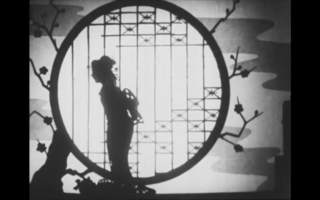 W
WMadame Butterfly's Illusion is a 1940 Japanese animated short. It was directed by Wagorō Arai, a dentist who created nearly a dozen short films between 1939 and 1947 in the style of silhouette animation. It is based on parts of the opera Madama Butterfly by Giacomo Puccini.
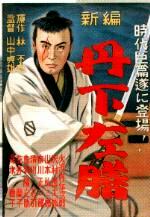 W
WThe Million Ryo Pot is a 1935 black and white Japanese comedy film directed by Sadao Yamanaka and starring Denjirō Ōkōchi.
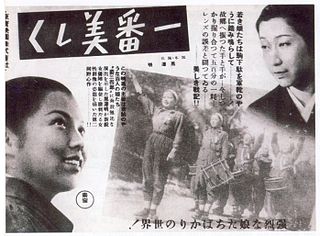 W
WThe Most Beautiful is a 1944 Japanese drama and propaganda film written and directed by Akira Kurosawa. The film is set in an optics factory during the Second World War when the film was produced.
 W
WMoyuru ōzora is a 1940 black-and-white Japanese, war film produced and directed by Yutaka Abe. The theme song was sung by Ichiro Fujiyama and composed by Kosaku Yamada.Special effects by Eiji Tsuburaya. Art Director: Takeo Kita Lighting: Tsuruzo Nishikawa Sound: Isamu Suzuki
 W
WMr. Thank You is a 1936 Japanese comedy-drama film written and directed by Hiroshi Shimizu. It is based on a short story by Nobel Prize-winning novelist Yasunari Kawabata, and noted for its portrayal of depression-era Japan and its location shooting.
 W
WThe Master Plan is a 2021 Japanese suspense-drama film. Based on Kaoru Yukinari's 2013 novel of the same title, the film is directed by Yuichi Sato, written by Mitsutoshi Saijo, and stars Takanori Iwata and Arata Mackenyu. It tells the story of Kida (Iwata) and Makoto (Arata), who grow up together and share a powerful bond. As former outcasts, they spend a decade fighting tooth and nail to the apex of the underworld and legit society respectively, so that Makoto can propose to a certain woman, who is rich and powerful. However, the proposal on Christmas Eve turns out to be an epic scheme involving all of Japan.
 W
WThe Neighbor's Wife and Mine is a 1931 Japanese comedy film directed by Heinosuke Gosho. It was Japan's first feature length film to fully employ sound.
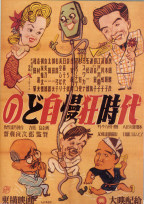 W
WNodo jimankyō jidai (のど自慢狂時代) is a 1949 black-and-white Japanese film directed by Torajiro Saito.
 W
WOdoroki ikka (おどろき一家) is a 1949 black-and-white Japanese film directed by Torajiro Saito.
 W
WOne Wonderful Sunday is a 1947 Japanese film co-written and directed by Akira Kurosawa. It is in black-and-white and runs 108 minutes.
 W
WOrochi is a 1925 black and white Japanese silent film with benshi accompaniment directed by Buntarō Futagawa. It is the most popular and beloved film of Tsumasaburō Bandō, featuring the star at the height of his fame.
 W
WThe Quiet Duel is a 1949 Japanese film directed by Akira Kurosawa.
 W
WRoningai , also known as Samurai Town: Story 1, Story 2 and Story 3, are respectively 1928 and 1929 black and white Japanese silent films directed by Masahiro Makino. Serving as parts of a 4-part series, the first and second installments are representative films of Masahiro Makino, the son of Shozo Makino. The Story 2 consists of two parts - the "first chapter" and "the solution".
 W
WSakanaya Honda (魚屋本多), also known as Fish and Swordsmanship and Sakanaya Kenpo, is a 1929 Japanese directed by Shuichi Yamashita.
 W
WSayon's Bell is a 1943 black-and-white Japanese film directed by Hiroshi Shimizu and based on the true story of a 17-year-old Atayal girl called Sayun Hayun from Nan'ao village, Giran district, Taihoku Prefecture, Taiwan, who went missing and was thought to have drowned whilst helping carry the luggage of her teacher Masaki Takita during a storm in 1938.
 W
WSinging Lovebirds is a 1939 Japanese film directed by Masahiro Makino. It is a musical comedy. Fulfilling his reputation as a fast worker, Makino made the film in only two weeks when an opening was created in the production schedule of another film, Yaji Kita Dōchūki, after its star, Chiezō Kataoka, came down with appendicitis. The film, however, has become "the most frequently revived Japanese prewar musical film," featuring music ranging from jazz to jōruri, and popular music stars like Dick Mine. Makino made other musicals like Hanako-san (1943) and was known for his rhythmic style. Singing Lovebirds also features Takashi Shimura, most famous as the lead samurai in Akira Kurosawa's Seven Samurai, in a singing role.
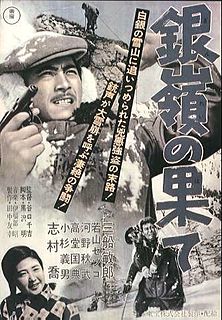 W
WSnow Trail is a 1947 black-and-white Japanese film directed by Senkichi Taniguchi from Akira Kurosawa's screenplay. It was the first film role for Toshirō Mifune, later to become one of Japan's most famous actors. Mifune and the other main actor in the film, Takashi Shimura, later became long-term collaborators of film director Akira Kurosawa.
 W
WSouls on the Road is a 1921 Japanese silent film directed by Minoru Murata. Film critic Mark Cousins wrote that it was "the first landmark film in Japanese history".
 W
WSozenji Baba is a 1928 black and white Japanese silent film directed by Masahiro Makino. It is an ambitious film in which Makino deals with the difficult issue of the agony of a person who killed for revenge.
 W
WThe Spell of the Sand Painting is a 1927 black-and-white silent Japanese film directed by Jukō Takahashi.
 W
WA Thousand and One Nights with Toho is a 1947 black-and-white Japanese film directed by Kon Ichikawa.
 W
WTojin Okichi is a 1930 film by Kenji Mizoguchi based on the novel by Gisaburo Juichiya.
 W
WTokyo March is a 1929 black and white Japanese silent film, originally presented with benshi accompaniment, directed by Kenji Mizoguchi. It is a classic melodramatic love story addressing social inequality in modern Japan, depicted in Mizoguchi's typical style. The theme song "Tokyo March" was originally sung by Chiyako Sato.
 W
WTotsugu hi made is a 1940 Japanese drama and romance film directed by Yasujirō Shimazu.
 W
WThe Water Magician is a 1933 black and white Japanese silent film directed by Kenji Mizoguchi and based on a story by Kyōka Izumi. It is one of the most popular titles from the silent film work of Mizoguchi and tells a tragic love story which realistically depicts the beauty and strength of the women of the Meiji period. It is currently available with benshi accompaniment.
 W
WYaji and Kita: Yasuda's Rescue is a 1927 Japanese black and white silent comedy film directed by Tomiyasu Ikeda and stars Denjiro Okochi and Goro Kawabe, his senior at Nikkatsu. The film showcases the comic talent of Denjiro Okochi, which contrasts with his performance in Oatsurae Jirokichi Koshi.